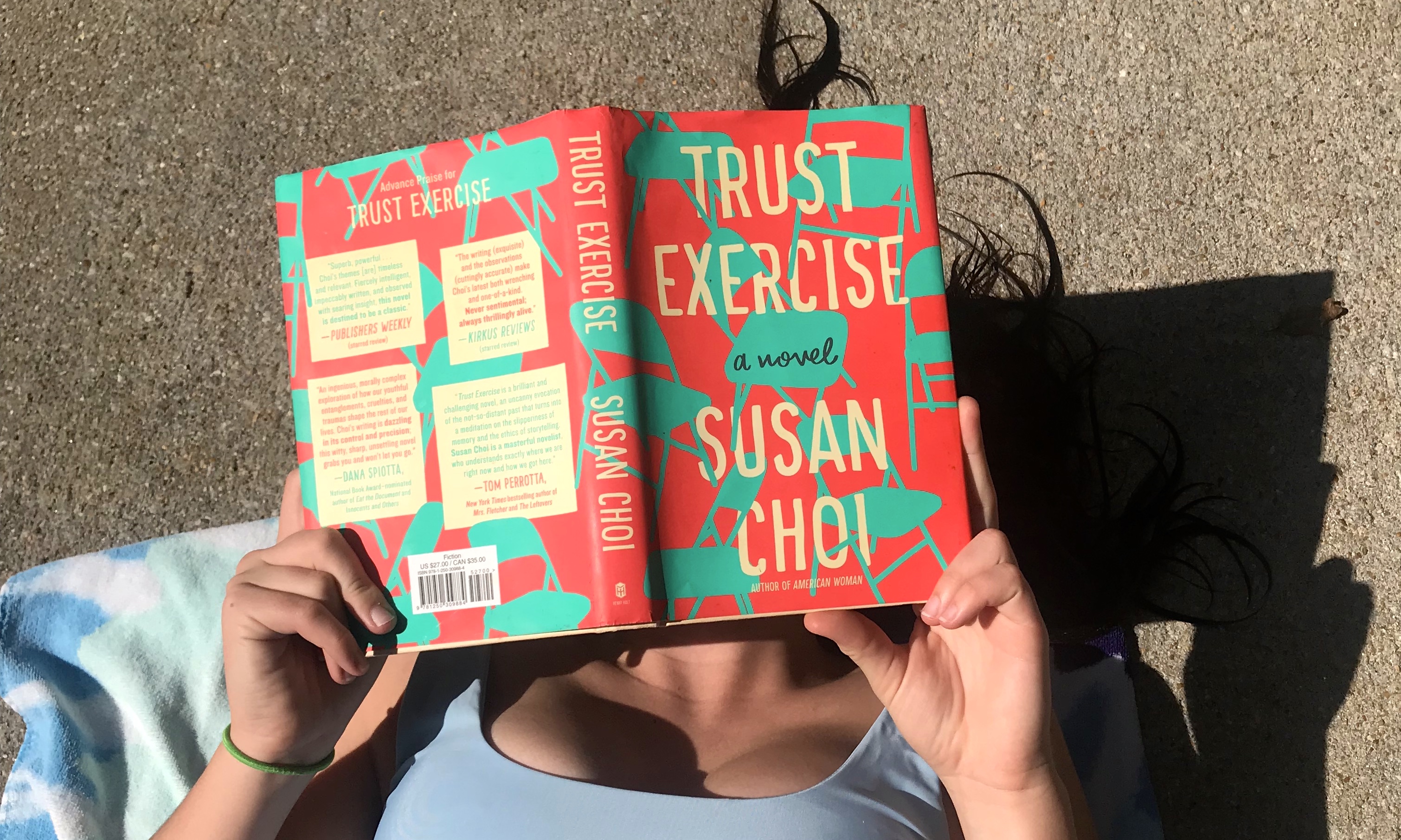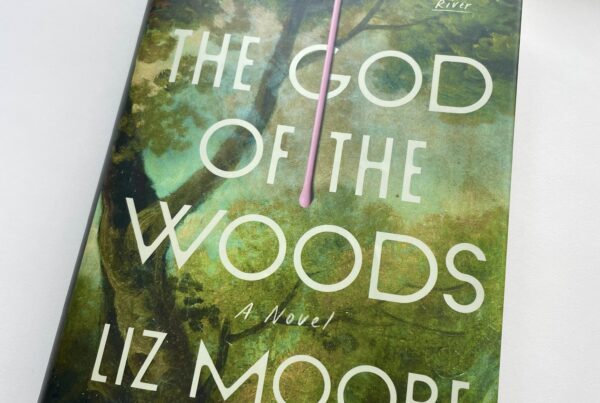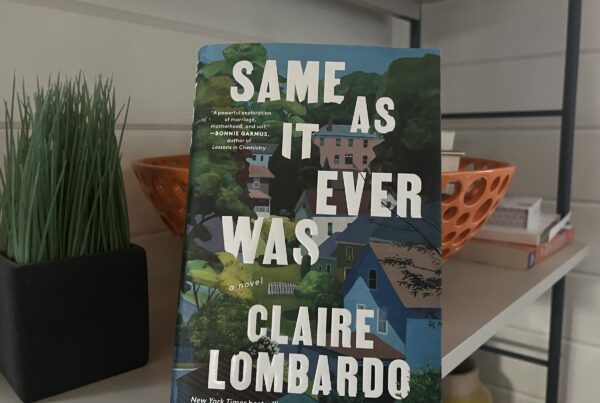What is the responsibility of fiction to truth? How is life filtered and transformed into a story that reflects back to the reader a semblance of reality? Should writers have to answer for what they omit, obscure, or reveal? How does performance, both theatrical and in our daily lives, mirror and transcend authenticity? In her complex and surprising novel, Trust Exercise, Susan Choi and her characters probe these questions: they concoct fictions within fictions, plays within plays. A staple of theatre class, trust exercises require that you fall backwards blindly, that you participate in forms of group therapy, that you offer up private pain in the service of “Art.” Choi’s novel presumes our trust even as it manipulates our understanding and twists back on itself, forcing us to reconsider what we think we know, forcing us to consider what demands we place on fiction. I was reminded of Asymmetry, Lisa Halliday’s startling, imaginative novel separated into three distinct sections that reference each other with subtle mirroring; and of one of my favorite novels, Ian McEwan’s Atonement, in which authorial control raises questions about fiction’s complicated relationship to truth. Choi’s virtuosity left me almost breathless in admiration, paging backwards, re-reading, searching for clear answers to satisfy my desire to know the “truth,” to confront my own expectations. If you would like to enter this book with only a vague sense of what happens, and no clearer knowledge of how the sections relate to each other, read no further; in other words, spoilers ahead!
The first section of Trust Exercise takes place in a sprawling, anonymous city where the main characters attend a prestigious performing arts high school modeled on the school Choi herself attended in Houston. It’s 1982, and as in the movie Fame, these gifted students are dramatic and intense, burningly adolescent, and the prose echoes their riotous hormonal experiences. Far from the bright lights of Broadway, they yearn to impress their charismatic teacher Mr. Kingsley, who slides into the room “like a knife” and uses his disdain and wit to captivate and bully them: “one longed to live up to his brilliance and equally feared it couldn’t be done.” Cruelly and gleefully embodying the role of tyrannical director, Mr. Kingsley focuses his trust games on David and Sarah, young lovers whose passionate connection is being performed for the others in all of its not-so-secret lust, love, and miscommunication. The narrative hews closely to Sarah, depicting her heartbreak, satirizing the school, touching on the outsize influence Mr. Kingsley wields, and remaining mostly sympathetic to Sarah and her teenage angst. The students are betrayed by the adults in their lives, though we see these relationships through Sarah’s eyes more as a product of the time and place than as the destructively inappropriate and damaging interactions we sense and that are later divulged. The arrival of a young English acting troupe and their older instructor propels divided loyalties and wince-inducing couplings that reverberate into the future. Before this story ends abruptly about half way through the novel on page 131, Sarah sums up the first section’s essence: “But that was fifteen in a nutshell, she’ll think when she’s twice, and then three times, that age. The obvious and the oblivious sharing the same mental space.”
The second section of Trust Exercise opens with a cool splash of water in your face: twelve years later, one of the minor characters in the first section, “Karen,” is waiting outside a bookstore for a reading by “Sarah,” author of what we’ve just read, the book “Karen” has stopped reading at page 131, and about which she has withering opinions. The tone of this section is dominated by Karen’s sharp, funny voice, and it serves as a bracing corrective to the hotly emotional language of Sarah’s book. The competing narrative raises questions about what is “true” and what is “fiction,” and Karen is eager to prove herself a major player rather than a neglected side character. Extremely observant, unsentimentally self-aware after years of therapy, reliant on the dictionary to unpack the layered denotation of words that express her emotions, obsessed with Sarah, Karen claims to have total recall, but her memories are evasive as well. Karen dismisses Sarah’s soft fiction as a betrayal of hard facts, both about the painful dissolution of their friendship and the relationship she had at fifteen with Martin, one of the English men that “deformed” her in ways left out of Sarah’s narrative. Karen’s section slips back and forth between first person in the voice of the woman that the character Karen is based upon and the third person as “Karen,” a daring choice that works according to Choi’s organic logic. As a result of her meeting with Sarah, Karen asserts her dominance as character, actor, and ultimately director when she manipulates a theatrical encounter among David, Sarah, Martin and herself that culminates in a telegraphed yet still shocking act of revenge. Karen’s insistence that memory be factual, that the record be set straight, is at odds with Sarah’s repurposing and protective spin on their shared experiences: “Sarah tells this story to reveal a hidden truth—or to hide the truth under a plausible falsehood, scrambling history unrecognizable with the logic of dream.”
The third and final section of the novel, titled as are the others, “Trust Exercise,” again reframes what has come before, but this time I believe we are to recognize a “factual” presentation of past and present events that fills in gaps, makes shocking revisions to characters, and raises more questions about what exactly has happened and to whom. A young woman’s vividly rendered violent encounter with a much older man to whom she has turned for guidance illustrates the accepted abuse of power that has dominated, although obliquely, the other sections of the book, where girls are beguiled into thinking they have agency when in fact their inexperience and innocence are exploited by men. In each section, women seek to control the narrative of their lives, as the reverberations from adolescence still linger, and in some ways, dominate their adult selves. Choi is an exceptionally talented writer, and Trust Exercise is a challenging and engaging book. Read it, so we can talk about it.




